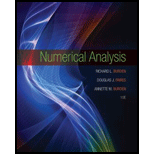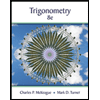
Numerical Analysis
10th Edition
ISBN: 9781305253667
Author: Richard L. Burden, J. Douglas Faires, Annette M. Burden
Publisher: Cengage Learning
expand_more
expand_more
format_list_bulleted
Concept explainers
Textbook Question
Chapter 4.7, Problem 1DQ
Describe the differences and similarities between Gaussian quadrature and the adaptive Gaussian quadrature method known as Gauss-Kronrod quadrature.
Expert Solution & Answer
Want to see the full answer?
Check out a sample textbook solution
Students have asked these similar questions
Business Discuss
Does the series converge or diverge
Does the series converge or diverge
Chapter 4 Solutions
Numerical Analysis
Ch. 4.1 - Use the forward-difference formulas and...Ch. 4.1 - The data in Exercise 1 were taken from the...Ch. 4.1 - Use the most accurate three-point formula to...Ch. 4.1 - Use the most accurate three-point formula to...Ch. 4.1 - The data in Exercise 5 were taken from the...Ch. 4.1 - The data in Exercise 6 were taken from the...Ch. 4.1 - Prob. 9ESCh. 4.1 - Use the formulas given in this section to...Ch. 4.1 - The data in Exercise 9 were taken from the...Ch. 4.1 - Prob. 12ES
Ch. 4.1 - Use the following data and the knowledge that the...Ch. 4.1 - Prob. 14ESCh. 4.1 - Prob. 15ESCh. 4.1 - Prob. 16ESCh. 4.1 - Prob. 17ESCh. 4.1 - Prob. 18ESCh. 4.1 - Prob. 19ESCh. 4.1 - Prob. 20ESCh. 4.1 - Prob. 21ESCh. 4.1 - In a circuit with impressed voltage (t) and...Ch. 4.1 - In Exercise 9 of Section 3.4, data were given...Ch. 4.1 - Derive an O(h4) five-point formula to approximate...Ch. 4.1 - Use the formula derived in Exercise 24 and the...Ch. 4.1 - a. Analyze the round-off errors, as in Example 4,...Ch. 4.1 - Derive a method for approximating f (x0) whose...Ch. 4.1 - Consider the function e(h)=h+h26M, where M is a...Ch. 4.1 - Prob. 1DQCh. 4.1 - Prob. 2DQCh. 4.2 - Apply the extrapolation process described in...Ch. 4.2 - Add another line to the extrapolation table in...Ch. 4.2 - The following data give approximations to the...Ch. 4.2 - Prob. 6ESCh. 4.2 - Prob. 7ESCh. 4.2 - The forward-difference formula can be expressed as...Ch. 4.2 - Prob. 9ESCh. 4.2 - Prob. 10ESCh. 4.2 - Prob. 11ESCh. 4.2 - Prob. 12ESCh. 4.2 - Prob. 13ESCh. 4.3 - Approximate the following integrals using the...Ch. 4.3 - Approximate the following integrals using the...Ch. 4.3 - Find a bound for the error in Exercise 1 using the...Ch. 4.3 - Prob. 4ESCh. 4.3 - Repeat Exercise 1 using Simpsons rule. 1....Ch. 4.3 - Prob. 6ESCh. 4.3 - Prob. 7ESCh. 4.3 - Prob. 8ESCh. 4.3 - Prob. 9ESCh. 4.3 - Prob. 10ESCh. 4.3 - Prob. 11ESCh. 4.3 - Prob. 12ESCh. 4.3 - The Trapezoidal rule applied to 02f(x)dx gives the...Ch. 4.3 - Prob. 14ESCh. 4.3 - Approximate the following integrals using formulas...Ch. 4.3 - Prob. 17ESCh. 4.3 - Suppose that the data of Exercise 17 have...Ch. 4.3 - Prob. 19ESCh. 4.3 - Prob. 20ESCh. 4.3 - The quadrature formula...Ch. 4.3 - The quadrature formula...Ch. 4.3 - Find the constants c0, c1, and x1 so that the...Ch. 4.3 - Find the constants x0, x1, and c1 so that the...Ch. 4.3 - Prob. 25ESCh. 4.3 - Prob. 26ESCh. 4.3 - Prob. 27ESCh. 4.3 - Derive Simpsons Three-Eighths rule (the closed...Ch. 4.3 - Prob. 1DQCh. 4.3 - Prob. 2DQCh. 4.4 - Use the Composite Trapezoidal rule with the...Ch. 4.4 - Prob. 2ESCh. 4.4 - Use the Composite Simpsons rule to approximate the...Ch. 4.4 - Prob. 4ESCh. 4.4 - Prob. 5ESCh. 4.4 - Prob. 6ESCh. 4.4 - Prob. 7ESCh. 4.4 - Prob. 8ESCh. 4.4 - Prob. 9ESCh. 4.4 - Prob. 10ESCh. 4.4 - Determine the values of n and h required to...Ch. 4.4 - Repeat Exercise 11 for the integral 0x2cosxdx. 11....Ch. 4.4 - Determine the values of n and h required to...Ch. 4.4 - Repeat Exercise 13 for the integral 12xlnxdx. 13....Ch. 4.4 - Prob. 15ESCh. 4.4 - Prob. 17ESCh. 4.4 - A car laps a race track in 84 seconds. The speed...Ch. 4.4 - Prob. 19ESCh. 4.4 - Prob. 20ESCh. 4.4 - Prob. 21ESCh. 4.4 - Prob. 23ESCh. 4.4 - Prob. 24ESCh. 4.4 - Prob. 25ESCh. 4.4 - Prob. 26ESCh. 4.4 - Prob. 1DQCh. 4.4 - Prob. 2DQCh. 4.5 - Use Romberg integration to compute R3, 3 for the...Ch. 4.5 - Use Romberg integration to compute R3, 3 for the...Ch. 4.5 - Prob. 3ESCh. 4.5 - Prob. 4ESCh. 4.5 - Use the following data to approximate 15f(x)dx as...Ch. 4.5 - Prob. 9ESCh. 4.5 - Prob. 10ESCh. 4.5 - Prob. 11ESCh. 4.5 - Romberg integration for approximating 01f(x)dx...Ch. 4.5 - Prob. 15ESCh. 4.5 - Prob. 18ESCh. 4.5 - Prob. 19ESCh. 4.5 - Prob. 1DQCh. 4.5 - Prob. 4DQCh. 4.6 - Prob. 1ESCh. 4.6 - Prob. 2ESCh. 4.6 - Prob. 11ESCh. 4.6 - Prob. 12ESCh. 4.6 - Could Romberg integration replace Simpsons rule in...Ch. 4.7 - Approximate the following integrals using Gaussian...Ch. 4.7 - Approximate the following integrals using Gaussian...Ch. 4.7 - Repeat Exercise 1 with n = 3. 1. Approximate the...Ch. 4.7 - Repeat Exercise 2 with n = 3. 2. Approximate the...Ch. 4.7 - Repeat Exercise 1 with n = 4. 1. Approximate the...Ch. 4.7 - Repeat Exercise 2 with n = 4. 2. Approximate the...Ch. 4.7 - Repeat Exercise 1 with n = 5. 1. Approximate the...Ch. 4.7 - Repeat Exercise 2 with n = 5. 2. Approximate the...Ch. 4.7 - Describe the differences and similarities between...Ch. 4.7 - Prob. 2DQCh. 4.8 - Prob. 1DQCh. 4.8 - Prob. 2DQCh. 4.8 - Prob. 3DQCh. 4.8 - Prob. 4DQCh. 4.9 - Suppose a body of mass m is traveling vertically...Ch. 4.9 - The Laguerre polynomials {L0(x), L1(x) ...} form...Ch. 4.9 - Prob. 7ESCh. 4.9 - Prob. 8ESCh. 4.9 - Prob. 9ESCh. 4.9 - Prob. 1DQCh. 4.9 - Prob. 2DQ
Knowledge Booster
Learn more about
Need a deep-dive on the concept behind this application? Look no further. Learn more about this topic, subject and related others by exploring similar questions and additional content below.Similar questions
- Suppose that a particle moves along a straight line with velocity v (t) = 62t, where 0 < t <3 (v(t) in meters per second, t in seconds). Find the displacement d (t) at time t and the displacement up to t = 3. d(t) ds = ["v (s) da = { The displacement up to t = 3 is d(3)- meters.arrow_forwardLet f (x) = x², a 3, and b = = 4. Answer exactly. a. Find the average value fave of f between a and b. fave b. Find a point c where f (c) = fave. Enter only one of the possible values for c. c=arrow_forwardThe following data represent total ventilation measured in liters of air per minute per square meter of body area for two independent (and randomly chosen) samples. Analyze these data using the appropriate non-parametric hypothesis testarrow_forward
- each column represents before & after measurements on the same individual. Analyze with the appropriate non-parametric hypothesis test for a paired design.arrow_forwardShould you be confident in applying your regression equation to estimate the heart rate of a python at 35°C? Why or why not?arrow_forwardGiven your fitted regression line, what would be the residual for snake #5 (10 C)?arrow_forward
- Calculate the 95% confidence interval around your estimate of r using Fisher’s z-transformation. In your final answer, make sure to back-transform to the original units.arrow_forwardCalculate Pearson’s correlation coefficient (r) between temperature and heart rate.arrow_forwardCalculate the least squares regression line and write the equation.arrow_forward
arrow_back_ios
SEE MORE QUESTIONS
arrow_forward_ios
Recommended textbooks for you
- Algebra & Trigonometry with Analytic GeometryAlgebraISBN:9781133382119Author:SwokowskiPublisher:Cengage
 Trigonometry (MindTap Course List)TrigonometryISBN:9781305652224Author:Charles P. McKeague, Mark D. TurnerPublisher:Cengage Learning
Trigonometry (MindTap Course List)TrigonometryISBN:9781305652224Author:Charles P. McKeague, Mark D. TurnerPublisher:Cengage Learning Elementary AlgebraAlgebraISBN:9780998625713Author:Lynn Marecek, MaryAnne Anthony-SmithPublisher:OpenStax - Rice University
Elementary AlgebraAlgebraISBN:9780998625713Author:Lynn Marecek, MaryAnne Anthony-SmithPublisher:OpenStax - Rice University

Algebra & Trigonometry with Analytic Geometry
Algebra
ISBN:9781133382119
Author:Swokowski
Publisher:Cengage

Trigonometry (MindTap Course List)
Trigonometry
ISBN:9781305652224
Author:Charles P. McKeague, Mark D. Turner
Publisher:Cengage Learning

Elementary Algebra
Algebra
ISBN:9780998625713
Author:Lynn Marecek, MaryAnne Anthony-Smith
Publisher:OpenStax - Rice University
Points, Lines, Planes, Segments, & Rays - Collinear vs Coplanar Points - Geometry; Author: The Organic Chemistry Tutor;https://www.youtube.com/watch?v=dDWjhRfBsKM;License: Standard YouTube License, CC-BY
Naming Points, Lines, and Planes; Author: Florida PASS Program;https://www.youtube.com/watch?v=F-LxiLSSaLg;License: Standard YouTube License, CC-BY